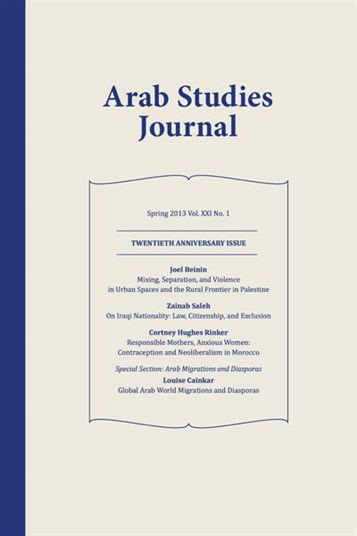The 2013 Annual Meeting of the Middle East Studies Association (MESA)will be held 10-13 October 2013 in New Orleans, Louisiana. The gathering represents a crossing point for scholarship in the field of Middle East studies and will feature over 200 panelists on a variety of topics as well as a four-day film festival and book exhibit.
Tadween has compiled a list of panels that will be focusing on education, publishing, and knowledge production, including the list of panelists on each panel.
Thursday, 10 October 2013
[R3529] Educational Reform in the Contemporary Middle East: A Crossroad of Global and Local
5:30pm
Torsten Janson (Lund University)
Reza Arjmand (Lund University)
Antonia Mandry (UNICEF)
Melek El Nimer Amer Bani Amer (Al Hayat Center for Civil Society Development)
[C3391] Knowledge Production in Egypt: Writing, Publishing and Translation
5:30pm
Maggie Nassif (NMELRC)
Maysa Abou-Youssef Hayward (Ocean College)
Enas Abou-Youssef (Cairo University)
Doria El Kerdany (University of North Carolina at Chapel Hill)
Friday, 11 October 2013
8:30am
Walter G. Andrews (University of Washington)
Selim Kuru (University of Washington)
Zeynep Seviner (University of Washington)
Muge Salmaner (University of Washington)
Elizabeth Nolte (University of Washington)
[P3578] Loose Canons in Middle Eastern Literature
2:00pm
Mona El-Sherif (University of Miami)
Jeannette E. Okur (University of Texas at Austin)
Thomas Thompson (UCLA)
Fatemeh Shams Esmaeili (University of Oxford)
Mahnia A. Nematollahi Mahani (Leiden University)
Youssef Yacoubi (Ohio State University)
[R3454] Digital Humanities in Middle East Studies Roundtable
4:30pm
Barre Ludvigsen (Østfold University College/American University of Beirut)
Will Hanley (Florida State University)
Jo Van Steenbergen (Ghent University)
Maxim Romanov (University of Michigan)
Chris Gratien (Georgetown University)
Harry Diakoff (Alpheios Project)
[P3317] The Role of Culture in the Arabic Classroom: Practices and Beliefs
4:30pm
Laila Familiar (University of Texas at Austin)
Jung Min Seo(University of Texas at Austin)
Emilie Durand-Zuniga(University of Texas at Austin)
Danilo Aquino(University of Texas at Austin)
Radwa El Barouni(Alexandria University)
Saturday, 12 October 2013
[S3634] On Unstable Ground: Academic Freedom and the Future of the University Work Force
11:00am
R. Kirk Belnap (Brigham Young University/ NMELRC)
Amy Newhall (MESA/University of Arizona)
Roberta Micallef (Boston University)
Chris Toensing (MERIP)
Alan Trevithick (New Faculty Majority)
John W. Curtis (American Association of University Professors)
[P3352] Palestine, Pedagogy, and the Arts
2:30pm
Nadia G. Yaqub (University of North Carolina at Chapel Hill)
Linda Quiquivix (Brown University)
Rula Quawas (University of Jordan)
Gonzalo Fernandez (Universidad Autónoma de Madrid)
Lokman Slim (UMAM Documentation and Research)
[R3326] Media, Media Literacy, and Teaching MES
5:00pm
Jeffrey A. VanDenBerg (Drury University)
Noor-Aiman Khan (Colgate University)
Ranjit Singh (University of Mary Washington)
Sunday, 13 October 2013
[P3322] The Dynamics of Contention in Middle East Studies
8:30am
Edmund Burke III (University of California, Santa Cruz)
Charles Kurzman (University of North Carolina, Chapel Hill)
John T. Chalcraft (London School of Economics)
Maha Abdelrahman (University of Cambridge)
Neil Ketchley (London School of Economics)
[P3586] At the Crossroads of Education
11:00am
Hany Abdul Galiil Fazza (Georgetown University SFSQ)
Rebecca Hodges (Washington University in St. Louis)
Elizabeth Buckner (Stanford University)
Catherine Orsborn (University of Denver/Iliff School of Theology)
Kendra Taylor (Pennsylvania State University)
[C3408] Authoritarianism and the Writing of History in Iraq
11:00am
Orit Bashkin (University of Chicago)
Toby Dodge (London School of Economics and Political Science)
Fanar Haddad (National University of Singapore)
Joseph Sassoon (Georgetown University)
[R3303] Historical Interpretation in the Teaching of Egypt`s 2011 Uprising
11:00am
Michael J. Reimer (American University in Cairo)
Khaled Fahmy (American University in Cairo)
Hanan Kholoussy (American University in Cairo)

![Now Available at Tadween Publishing in Partnership with Tadamun: "Planning [in] Justice العدالة في التخطيط"](https://kms.jadaliyya.com/Images/135x94xo/covers210326041535580~.png)
















